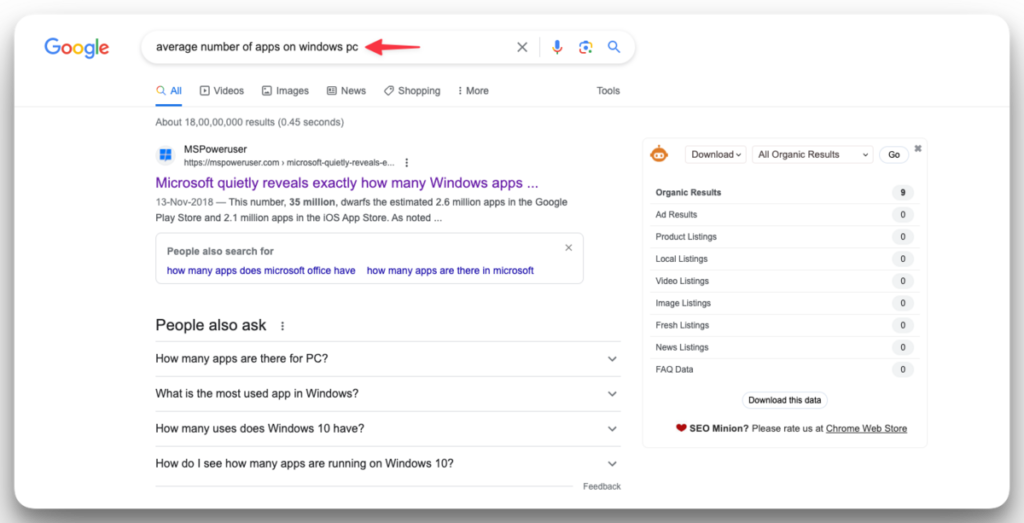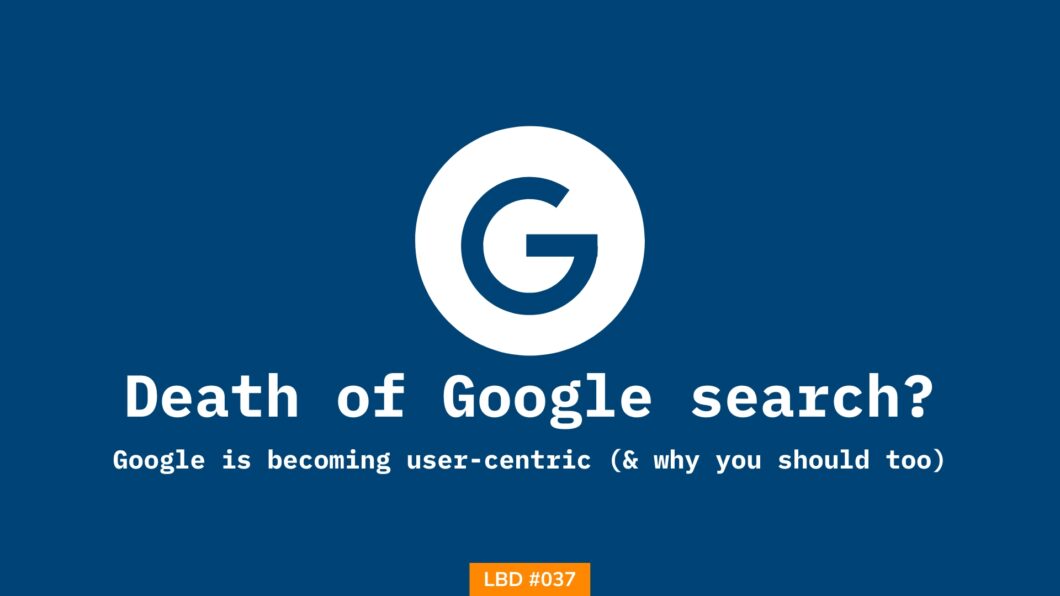Table of Contents
TL;DR & Summary
A lot of businesses are wanting to expand their reach online. Some are born just to thrive online. The internet is growing bigger every day. But it’s also getting really bad.
Note: It’s not that SEO or search is dying, but the internet has grown so big that it’s difficult for one search engine to manage. Apart from this, the number of people trying to fool the system to make money is at an all-time high.
Ex-Googler, Marissa MAYER, appeared on an episode of Freakonomics. She was #20 at Google, and left Google to become CEO & president of Yahoo!
She revealed some interesting details about the quality of the search right now. It’s not that Google or any search engine for that matter is bad. Search engines are just a window into the search.
What’s really bad is the content that the search engines crawl, index & rank. This is something search engines can’t fix.
This issue isn’t to rant about the quality of content on the web, but we will talk about the solutions to not lose as a business owner.
By the end of this issue, you will be able to:
- Identify key areas to branch out
- Action items to reduce the relevance of the search
- Learn the right way to create content, that’s helpful
This issue is thus far, the most difficult issue I’ve written for Letters Bydavey. I’m technically voicing against SEO. Which is okay, as far as it helps you. But the problem isn’t SEO, it’s the unawareness of what quality content means.
The unawareness is the problem. I’m going to fix that.
Google has easily seen trillions of URLs thus far & has stored a copy of those results in their billions of dollars worth of database, aka search index. The problem is, Google has way too much data for almost everything. Nothing original. Everything regurgitative.
While Google has a great product and a market share of nearly 90%, it is obvious that any business owner would want exposure from this giant. This is where the problem starts getting worse. Google has so much data, that the algorithm finds it extremely difficult to rank good & relevant content.
What you see on the first page is a highly optimized version of information that’s made for search engines. Turn to Google with a very specific problem & get a bunch of irrelevant links trying to sell you something. Turn to Reddit, and you’re done within a minute or so.
Here’s an example of a Google search I made to make my point. Pay attention to the search query and the first result. 100% irrelevant.

The primary reason why the search is getting worse
The problem with content marketing these days is that most businesses:
- Create product-led content
- Create content for search engines
- Create content purely based on search volume (for info blogs, this is okay)
- Create content for traffic, & not for sales
- Content doesn’t address the intent
The whole point of having a blog that ranks on search engines was to sell products/services. With the increase in the number of internet users, increase in demand for content & decrease in the supply of quality content, room for improvement of good content on search got bigger & bigger.
Don’t worry. As big as this problem appears to be, it actually isn’t. Let me share 3 simple ways you can ensure you keep crushing the business goals even if Google search keeps getting worse.
Step 1: Build a personal brand
Linkedin & Twitter are the places you should be spending most of your time. Apart from creating content for search, you should be leveraging social media platforms. Social sites may go away, and searches may get compromised, but the email list will remain yours, like forever.
Building an engaged user base using social media is the ultimate growth hack that you can work on. If you already have decent traffic coming in from search, use that to divert users to social channels. Make sure you create amazing content on social media, apart from the repurposing that you might be doing.
Here are a few easy steps to get started:
- Pick one platform where your audience is most like to discover you
- Identify one set of audiences that you want to cater to. You can’t please/target everyone. You shouldn’t.
- Identify content categories you’d be creating the content on. This should be based on their interests. Use tools like Audiense or Pulsar for this.
- While you’re growing, engage with other creator’s content & add genuine value
Step 2: Create better content (that’s not inspired by search volume)
Search volume is the second thing I hate the most in SEO. The first is backlinks. People have totally misunderstood the concept of backlinks & are doing it wrong. That’s a story for another issue.
Search volume is probably the most misleading metric one can follow. First, why is search volume always in whole numbers? Pick any tool of your choice. Search volume will be shown in whole numbers. I know, they round off. Or maybe the tools are inaccurate? Of course, they are.
Even if the search volume data were accurate, you’d get 20%-25% of the clicks. That is, if the search volume is 10,000 per month, you’d get 2500 clicks for that keyword. Sure, you can rank for several keywords & 20%-25% of all keywords would mean decent traffic for one page. And that’s the point. Search volume is a confusing metric to chase.
Instead, create content based on the significance of the intent. If you’re marketing a product, beauty products, for instance, you can create content around the need for beauty products in the first place. Brainstorming customer profiles that would document:
- What kind of person would be interested in beauty products?
- Why are they interested in the products you sell?
- What are the problems they face?
- What are the obstacles they have in using (or not) your products?
I’m not a huge fan of product-led content marketing. Where the center of all your content marketing efforts is your product & not your customers. Product-led content marketing is what led to this mess in the first place.
Note: You can also optimize for other search engines like Bing (second highest market share). Bing is in a phase, Google was a couple of decades ago. Although the search index is significantly smaller, the quality of results is much better. This means people are more likely to use this search engine. Which also means, more exposure. MORE EXPOSURE!
Step 3: Divert them to the newsletter
Search engines will evolve to an extent where only the best of the best websites will get traffic. That day is far, in the distant future. Right now, there’s no reason to worry. Search engines are in favor of creators/businesses, at least for now. There will always be scenarios where some businesses would lose everything because of one tweak in the algorithm. That’s exactly why owning the audience is important.
A newsletter is the best instrument to own the audience. I’m not talking about exchanging emails for cheap lead magnets or buying emails from Fiverr/Upwork. I’m talking about building really engaged audience that you extracted from search & social platforms.
This is the place where you can incorporate 100% product-led content marketing. You can do it because have opted in for that. Not by force, but by choice.
How to build one?
- Use Substack, Beehiiv (if you want to leverage a feed-based newsletter platform) or use Convertkit, or Aweber to take the traditional email marketing route
- Pick a day, and publish a post on that day, at the same time. No matter what
- Promote your newsletter, every other day on every platform possible.
- Publish the delayed edition on your blog (extra traffic anyone?)
That’s pretty much it. Repeat this till you crush your goals. You’ll be surprised how many strangers will subscribe to your work.
SEO this week
- Google Bard has started citing sources
- Bing starts to roll out more AI-powered features within Microsoft systems
- AI war is turning rough. Neeva search is shutting down
- New crawler added to Google crawlers list. This time for testing purposes
- Got a news site? Google has shared best practices for your news site
Clickworthy resources
- ChatGPT making its way to Android? Learn these AI prompts beforehand
- Build links the right way (without messing around with the algo)
- Build a brand: Learn from the guy who sells water in a beer can
Tools that you should know about
- Perplexity AI has rolled out an update that might break the internet. Don’t look at it as a creator, look at it as a consumer. Learn about the search intent of a user.
Surf the AI Wave
- Amazon is hiring AI engineers. Annual salary is up to $230k. MIND. BLOWN.
- If you think generative AI has reached its limits, you’re about to get shocked.
How can I help you?
I put a lot of effort to come up with a single edition of this newsletter. I want to help you in every possible way. But I can do only so much by myself. I want you to tell me what you need help with. You can get in touch with me on LinkedIn, Twitter & Email to share your thoughts & questions that you want to be addressed. I’d be more than happy to help.
If you’re looking forward to winning online, here’s how I can help:
- Sit with you 1-on-1 & create a content marketing strategy for your startup. Hire me for paid consulting.
- Write blogs, social posts, and emails for you. Get in touch here with queries (Please mention you found this email in the newsletter to get noticed quickly)
- Join my tribe on Twitter where I share SEO tips (every single day) & teaser of the next issue of Letters ByDavey.

